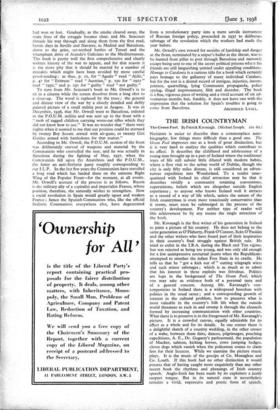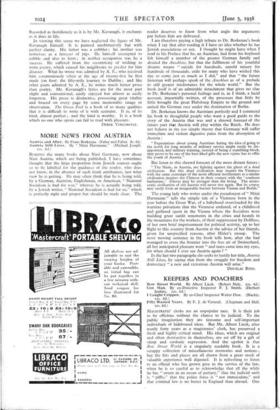THE IRISH COUNTRYMAN
The Green Fool. By Patrick Kavanagh. (Michael Joseph. los. 6d.)
NOTHING is easier to describe than a commonplace auto- biography, few things more difficult than a good one. The Green Fool impresses one as a book of great distinction, but it is very hard to analyse the qualities which contribute to its effect. It describes the childhood and adolescence of a young man brought up in a part of Ireland where the traditional ways of life still subsist little diluted with modern habits, where a first visit to the urban world of Dublin, though the city is only fifty miles distant, is still considered an adven- turous expedition into Wonderland. To a reader unac- quainted with Ireland its chief attraction may be that it describes vividly a community retaining conventions, superstitions, beliefs which are altogether outside English experience ; to anyone who knows Ireland well it attracts as a record of a way of life which, unless the nature of the Irish countryman is even more tenaciously conservative than it seems, must soon be submerged in the process of the country's development. For neither type of reader will this achievement be by any means the single attraction of the book.
Mr. Kavanagh is the first writer of his generation in Ireland to paint a picture of his country. He does not belong to the same generation as O'Flaherty, Frank O'Connor, Seim O'Faolain and the other writers who have found part of their inspiration in their country's final struggle against British rule. He tried to enlist in the I.R.A. during the Black and Tan regime, but was rejected as being too young, and was only old enough for a few unimpressive nocturnal jaunts when the Republicans attempted to smother the infant Free State in its cradle. He tells us that he " got a kick out of " cutting telegraph wires and such minor sabotages ; which is as much as to admit that his interest in these exploits was frivolous. Politics are kept in the background of The Green Fool, which one may take as evidence both of a personal taste and of a general concern. Among Mr. Kavanagh's con- temporaries in Ireland there is a widespread boredom with politics in the usual sense ; and a corresponding growth of interest in the cultural problem, how to preserve what is most valuable in the country's folk life when the outside world threatens to rush in and swamp it through the channels formed by increasing communication with other countries. What there is to preserve is in the foreground of Mr. Kavanagh's picture. It is a crowded canvas, equally admirable for its effect as a whole and for its details. In one corner there is a delightful sketch of a country wedding, in the other corner of a wake, between them fairs, dances, pilgrimages, poaching expeditions, A. E., Dr. Gogarty's parlourmaid, the population of Mucker, salmon, kicking horses, cows jumping hedges, clever dogs which vanish when the policeman comes to claim fees for their licences. While we examine the picture music plays. It is the music of the gossips of Co. Monaghan and co. Louth. If this book had no other distinction it would possess that of having caught more exquisitely than any other recent book the rhythms and phrasings of Irish country speech. Anglo-Irish has been made by its exploiters a justly suspect tongue. But in its natural state it nevertheless remains a ilia, expressive and poetic form of speech.
Recorded as fastidiously as it is by Mr. Kavanagh, it enchants as it does in 'life.
In viewing this scene we have neglected the figure of Mr. Kavanagh himself. It is painted unobtrusively but with perfect clarity. His father was a cobbler ; his mother was notorious as a fattener of pigs. He himself attempted to cobble and also to farm ; in neither occupation was he a success. He suffered from the eccentricity of wishing to write poetry, which caused his neighbours to predict for him disaster. What he wrote was admired by A. E., who received him ceremoniously when at the age of twenty-five he. first made (on foot) the fifty-mile journey to Dublin ; and like other poets admired by A. E., he writes much better prose than poetry. Mr. Kavanagh's lyrics are for the most part slight and conventional, easily enjoyed but almost as easily forgotten. His prose is distinctive, possessing great vitality and braced on every page by some memorable image or observation. The Green Fool is a book of so many qualities that it is difficult to write of it with restraint. It is, of its kind, almost perfect ; and the kind is worthy. It is a book which no one who opens can fail to read with pleasure.
DEREK VERSCHOYLE.



















































 Previous page
Previous page